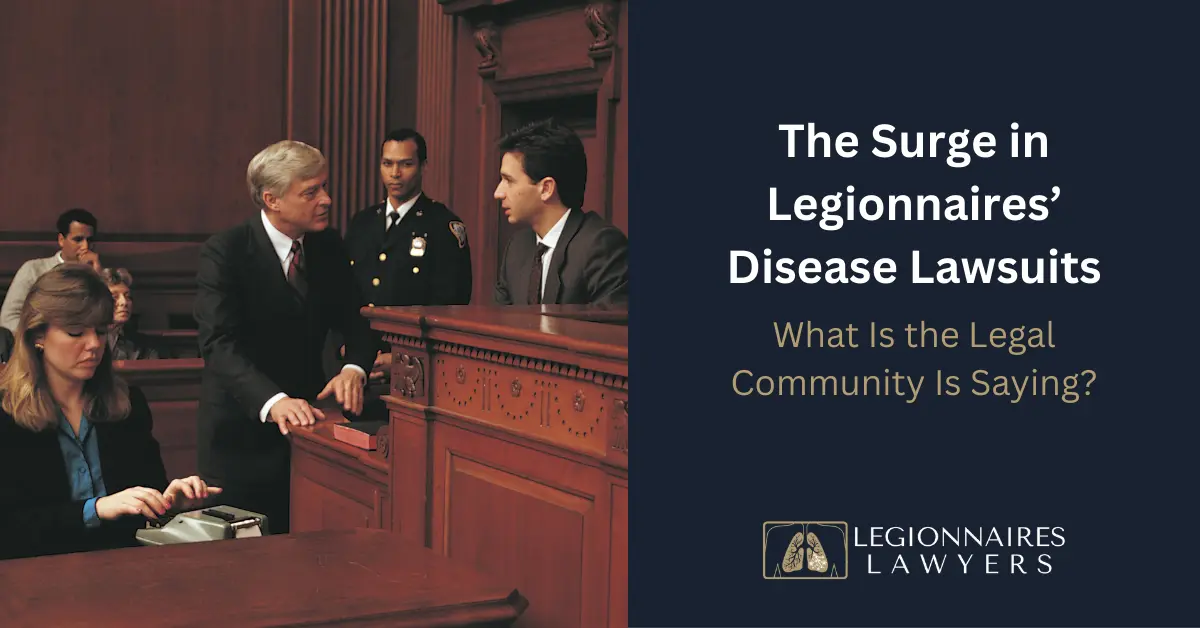
In recent years, Legionnaires’ disease litigation has significantly increased, prompting discussions among lawyers about its rising frequency and the broader implications for property owners and businesses.
Legionnaires’ disease, caused by Legionella bacteria, is a severe form of pneumonia that can result in long-term health complications and, in some cases, death.
With the frequency of outbreaks growing across the United States, the legal community is seeing an uptick in lawsuits, many of which are focused on holding property owners and businesses accountable for negligence in maintaining water systems.
What Is Legionnaires’ Disease, and Why Is It Leading to More Lawsuits?
Legionnaires’ disease is a serious, sometimes fatal, bacterial infection linked to poorly maintained water systems.
- Caused by Legionella bacteria, which thrive in warm, stagnant water
- Spread by inhaling contaminated water droplets (cooling towers, hot tubs, A/C units)
- High risk for people with weakened immune systems
According to the CDC, about 18,000 hospitalizations occur yearly in the U.S. As outbreaks rise, lawsuits are increasing against building owners and managers who fail to maintain water safety.
The Legal Consequences of Legionnaires’ Disease: Growing Liability for Property Owners
Negligence in water system maintenance creates significant legal liability. Property managers, hotel operators, and contractors are frequently sued for failing to uphold their duty of care.
When systems such as cooling towers or hot tubs are not properly cleaned, disinfected, and tested, the result can be exposure to Legionella—and subsequent legal action.
Beyond lawsuits, businesses face reputational harm and steep financial losses. Ignoring regulations or cutting corners on water safety has proven to be a costly mistake.
Notable Legal Cases and Precedents: Lessons from Major Legionnaires’ Outbreaks
High-profile outbreaks have set strong legal precedents and costly settlements.
- Bronx 2015 outbreak: 16 deaths, 100+ illnesses, traced to a poorly maintained cooling tower. Resulted in lawsuits and new regulations (NYC Local Law 77).
- Wingate Inn & Disneyland outbreaks: Failure to maintain water systems led to litigation and multi-million-dollar settlements.
These cases proved that courts take water safety seriously—and businesses face severe consequences for neglect.
The Role of Regulations in Legionnaires’ Disease Litigation
Compliance with regulations and safety standards has become a central issue in litigation. Standards such as ASHRAE Standard 188-2021—which offers guidance for preventing Legionella in building water systems—are increasingly cited in lawsuits. While voluntary in many jurisdictions, courts often evaluate whether property owners followed them as part of their duty of care.
Cities and states have also adopted stricter laws. For example, New York now requires cooling tower inspections, cleaning, and testing. Businesses that ignore these rules not only risk outbreaks but also face harsher legal consequences when negligence is proven.
Proactive Legal Strategies: How to Avoid Legionnaires’ Disease Lawsuits
The best defense is prevention through strong water management practices.
Steps businesses should take:
- Develop a Water Management Plan (WMP) with cleaning, testing, and disinfection schedules
- Document maintenance and comply with all regulations
- Use preventive measures such as chlorine dioxide treatment and system audits
Courts consider whether businesses acted reasonably. Documented safety efforts strengthen legal defense and protect public health.
Consulting with Legionnaires’ Disease Lawyers: What to Do If You’ve Been Affected
Victims of Legionnaires’ disease should seek legal counsel immediately. Specialized attorneys can investigate the outbreak, identify the responsible parties, and pursue compensation for medical costs, lost wages, and pain and suffering.
Because these cases involve both medical complexity and technical water system issues, working with an attorney who understands both is critical. A skilled lawyer can navigate the legal process and ensure victims’ rights are fully protected.
In Conclusion: The Growing Need for Legal Vigilance in Legionnaires’ Disease Cases
Legionnaires’ disease litigation is growing, and water system safety can no longer be ignored. Property owners must adopt preventive strategies, comply with all safety standards, and respond quickly to potential risks. The cost of neglecting water systems goes beyond financial penalties—it endangers public health and invites significant legal consequences.
For individuals impacted by the disease, consulting with an experienced Legionnaires’ disease lawyer is the best way to pursue justice and hold negligent parties accountable.


